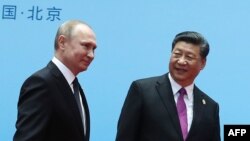Provoking trade disputes is “naked economic terrorism,” a senior Chinese diplomat said Thursday, ramping up the rhetoric against the United States amid a bitter trade war that is showing no signs of ending soon.
Trade tensions between Washington and Beijing escalated sharply earlier this month after the Trump administration accused China of having “reneged” on its previous promises to make structural changes to its economic practices.
Washington later slapped additional tariffs of up to 25% on $200 billion of Chinese goods, prompting Beijing to retaliate.
Opposed to big sticks
Speaking to reporters in Beijing, Chinese Vice Foreign Minister Zhang Hanhui said China opposed the use of “big sticks” like trade sanctions, tariffs and protectionism.
“We oppose a trade war but are not afraid of a trade war. This kind of deliberately provoking trade disputes is naked economic terrorism, economic homicide, economic bullying,” Zhang said, when asked about the trade war with the United States.
Everyone loses in a trade war, he added, addressing a briefing on Chinese President Xi Jinping’s state visit to Russia next week, where he will meet Russian President Vladimir Putin and speak at a major investor forum in St Petersburg.
“This trade clash will have a serious negative effect on global economic development and recovery,” Zhang added.
“We will definitely properly deal with all external challenges, do our own thing well, develop our economy, and continue to raise the living standards of our two peoples,” he said, referring to China and Russia.
“At the same time, we have the confidence, resolve and ability to safeguard our country’s sovereignty, security, respect and security and development interests,” he added.
China's message
From combative missives in state media and patriotic fervor on social media, to a mobilization of ambassadors around the world to get its message out, China has intensified its criticism of Washington since the United States this month moved to increase tariffs on Chinese imports and blacklisted tech giant Huawei Technologies Co Ltd.
On Thursday, a broadcaster from Chinese state television and a Fox Business host staged an unprecedented live debate about the China-U.S. frictions on the U.S. cable network.
Over the past two weeks, China has hinted that it may use its dominant position as an exporter of rare earths to the United States as leverage in the trade war. Rare earths are a group of 17 chemical elements used in everything from high-tech consumer electronics to military equipment.
On Thursday, the state-run China Daily newspaper said “it would be naive to think that China does not have other countermeasures apart from rare earths to hand.”
“As Chinese officials have reiterated, they have a ‘tool box’ large enough to fix any problem that may arise as trade tensions escalate, and they are ready to fight back ‘at any cost,’” it said in an editorial.
China has consistently rebuffed U.S. complaints about lack of access to its economy for foreign companies, forced technology transfers and intellectual property protection, and repeatedly promised further economic reforms.
Speaking at a separate forum in Beijing, Wang Zhaoxing, a vice chairman of China’s banking and insurance regulator, said the last four decades of the country’s economic reforms have shown that “openness brings progress, shutting off brings backwardness.”
“It is undeniable that the current economic globalization has indeed encountered some new problems and new challenges,” Wang said. “However, the solution is not to return to protectionism and unilateralism.”







